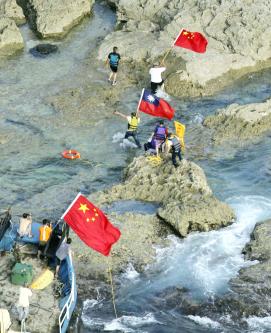Following the latest confrontation over the Diaoyutai Islands (釣魚台) between Japan and pro-China activists, President Ma Ying-jeou’s (馬英九) administration yesterday chastised Japan, while being reserved in its criticism of the activists.
“[Taiwan] calls on Japan to realize there exists a dispute over the sovereignty of the Diaoyutai Islands and to consider [Taiwan]-initiated proposals on how to handle the issue in a pragmatic and effective way. [Japan] should not be oblivious to the fact of contention,” a statement released by the Ministry of Foreign Affairs (MOFA) said last night.
The statement was based on the conclusions reached at a meeting presided over by National Security Council Secretary-General Hu Wei-chen (胡為真) in response to the latest spat over the islands.
On Wednesday, a boat carrying 14 activists from Hong Kong, Macau and China landed on the Diaoyutais. Taiwanese activists did not join the action because they were not able to rent a fishing boat.
Seven of the activists jumped from the boat onto the island and placed Republic of China (ROC) and People’s Republic of China (PRC) flags on the island. All 14 activists were later arrested by the Japan Coast Guard and were still in custody as of press time.
The government said in the statement yesterday that it hoped “all concerned parties” would refrain from provoking confrontational sentiment between their peoples and taking action that could destabilize the region, without specifying who the concerned parties were.
The government reiterated Taiwan’s sovereignty over the islands, saying that acts performed by other parties did not alter that fact.
It added that it would act in the spirit of peace under Ma’s East China Sea peace initiative when dealing with the issue and related disputes over fishing rights in its relations with Japan, and that it would not team up with China in this regard.
Separately yesterday, Ma also reiterated the nation’s sovereignty over the islands.
The government also urged Tokyo to release the 14 activists.
“The arrests were of no help in maintaining stability in the region,” MOFA spokesperson Steve Hsia (夏季昌) said, adding that Taiwan had conveyed its position to the Japanese government on Wednesday night, soon after it learned of the arrests.
The ministry has not yet received a response from Tokyo, Hsia said.
While the government has repeatedly stated that the Diaoyutais belong to Taiwan and that it would not work with China in the dispute over sovereignty of the islands, it appears it had no plan to take action against the activists who landed on the islands on Wednesday without Taiwan’s permission.
Asked for a comment on the action staged by the pro-China activists, Hsia said: “They did not obtain our [Taiwan government] permission to go to the islands.”
Further pressed as to whether Taiwan condemned the pro-China activists, Hsia repeatedly said: “We will see how to deal with it properly,” before he eventually said: “We disapprove of the action.”
When asked for comment on the activists carrying both the ROC and PRC flags, Hsia said that was a matter of “freedom of expression.”
Democratic Progressive Party Legislator Chao Tien-lin (趙天麟) yesterday criticized the Ma administration over its reaction to the incident, saying it has put itself in a “double embarrassment” situation.
“President Ma Ying-jeou repeatedly stated that the Diaoyutais are ROC territory, but this incident shows Japan is in actual control of the islands. It’s embarrassing for the government,” Chao said.
“And, when the government claims that the Diaoyutais are ROC territory, it’s not doing anything when people from Hong Kong, Macao and China landed on the island without permission,” he added.
He called on the Ma government to urge both Japan and Diaoyutai activists from Hong Kong, Macao and China to respect the ROC’s sovereignty over the islands.
“The Diaoyutai activists have illegally entered into ROC territory, so the National Immigration Agency (NIA) should do something about it,” Taiwan Solidarity Union Legislator Huang Wen-ling (黃文玲) said.
She added that she did not expect the government to do anything because Ma seems to turn “soft” whenever it comes to dealing with China.
Asked to comment on the criticism, NIA Deputy Director-General Chang Chi (張琪) said it was a complicated issue.
“Certainly, the Diaoyutais are our territory, but it is disputed, with Taiwan, China and Japan all making the territorial claim,” Chang said.
“It’s not an issue that can be dealt with using our domestic laws,” he added.
Mainland Affairs Council Deputy Minister Chang Hsien-yao (張顯耀), meanwhile, did not directly answer the question as to whether the activists had illegally entered ROC territory.
“[The question] does not exist, because they [the activists] are in Japanese custody, not ours,” he said.
“Our official stance is that the Diaoyutais are ROC territory, there’s no doubt about it, and the MOFA stressed that stance today in its latest communication with Japan,” Chang added.
Source: Taipei Times - 2012/08/17





















